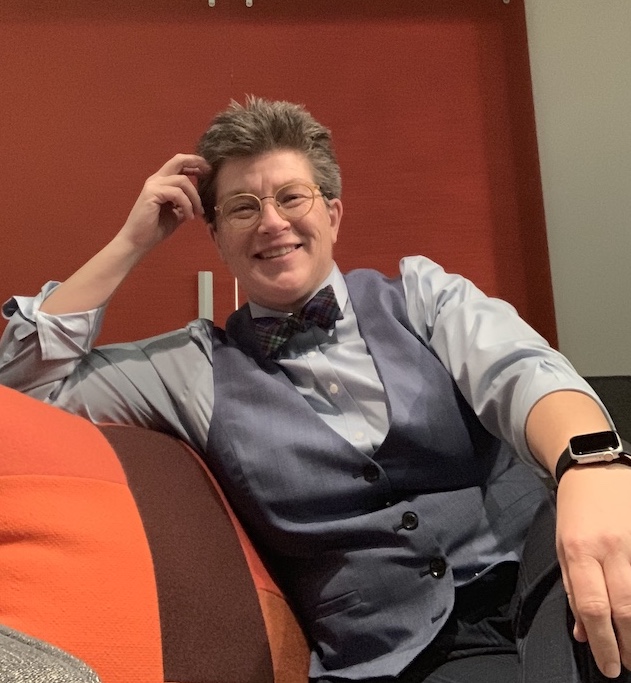| Faculty Profile |
|
Department
Department of Public Health
Secondary Title
Chair, Department of Public Health
Office
3181 Faculty/Administration Building (FAB)
Biography
Greetings all. Like many of you, I am a first-generation college student. I started at the local community college two miles from my parents’ home in suburban Chicago. I earned an associate’s degree in Social Sciences (1984) from Harper College. That 2-year college experience made it possible for me to transfer to (and afford!) DePaul University in downtown Chicago. At DePaul, I earned a bachelor’s degree in Political Science (1986) and a master’s degree in Public Service Management (1988). Why political science? Because, at the time, I thought Dick Farkas was the most interesting teacher I had ever met -- and if you took every course he taught, well, you'd end up with a degree in political science. Moral of the story -- find interesting teachers and take every class they teach!
But my life and career took a turn during the late 1980s. I felt driven to work on the growing HIV/AIDS crisis. I won the professional lottery when real public health superstars -- Marshall Becker, Barbara Israel, Marc Zimmerman, Nancy Janz, and Nick Freudenberg -- hired me to work on their research team evaluating HIV/AIDS prevention and service organizations funded by the Robert Wood Johnson Foundation (RWJF). Working closely with these faculty mentors from the University of Michigan School of Public Health and Hunter College (NYC), we traveled to Chicago, IL; San Francisco, CA; Cleveland, OH; and Alabaster, AL among other places to assess and learn from community-based HIV/AIDS organizations. I was hooked on public health and have never looked back. Propelled by this experience, I completed my education at the University of Michigan in Ann Arbor, earning a Master of Public Health (MPH) degree in Health Behavior/Health Education (1992) and a PhD in Education (1999).
Since then, my own research agenda has largely focused on the measurement of patient-centered outcomes. I work on clinical trials and intervention ersearch studies with physicians, physical therapists, pharmacists, and other health care providers. My role is to make sure that decisions about disease progression or treatment success take into account patient preferences and important indicators like quality of life, patient satisfaction, mobility, and functional status. I have worked on more than 20 research studies with $33+ million in funding from the Substance Abuse and Mental Health Services Administration, National Institute on Disability and Rehabilitation Research, National Science Foundation, National Institute for Child Health and Human Development, National Eye Institute, and the Centers for Disease Control and Prevention. These community-based research and clinical trials have addressed a range of health problems including HIV/AIDS, glaucoma and strabismus, breast and colorectal cancer, stroke, ulcerative colitis and Crohn’s disease, mental health and suicide, and pelvic floor disorders in women.
You could also say that teaching may be my first love. I try to honor what Professor Dick Farkas sparked in me by fully committing to my own classroom teaching. I have taught intensive seminars to a dozen MPH students, lecture courses to 200 first-year undergraduate students, and everything in between. You can generally find me teaching PH 2100 -- Introduction to Public Health. I *love* teaching the intro course -- the material is dynamic, always changing, and intended to get us all wrestling with health disparities, social inequalities, and evidence-based decision-making using public health principles and data.
Finally, I am honored to serve as the chair of the undergraduate Department of Public Health. I intend to bring a wealth of experience in higher education leadership, strategic planning, and academic administration to this position. Previously, I served as Director of the Health Sciences and Applied Health Sciences Programs at Oakland University (Rochester, MI) and was founding director of the Master of Public Health (MPH) Program there. More recently, I was Chair of the Department of Health and Human Services at the University of Michigan-Dearborn.
My position as Professor of Public Health at Wayne State University is my dream job. I am a native Detroiter who has lived in the shadow of campus for more than a decade. I get to use training in public health to lift my city, its residents, and the metro region. I am so excited to be a part of this effort with all of you.
Selected publications
Wei JT, Dunn R, Nygaard I, Burgio K, Lukacz ES, Markland A, Wren PA, Brubaker L, Barber MD, Jelovsek E, Spino C, Meikle S, Janz N and for the Pelvic Floor Disorders Network (2017). Development and validation of a quantitative measure of adaptive behaviors in women with pelvic floor disorders. Female Pelvic Medicine & Reconstructive Surgery. 23(4):232-237. PMID: 28650896. doi: 10.1097/SPV.0000000000000431.
Doherty D, Maher SF, Ivanikiw C, Hales M, Lebiecki T, Wren PA (2017). Perceptions of cultural competency in Doctor of Physical Therapy students. Journal of Cultural Diversity. 24(2):31-38.
Hawley LD, MacDonald MG, Wallace EH, Smith J, Wummel B, Wren PA (2016). Baseline assessment of campus-wide general health status and mental health: Opportunity for tailored suicide prevention and mental health awareness programming. Journal of American College Health. 64(3):174-83. PMID: 26629894. doi: 10.1080/07448481.2015.1085059.
Huggins JE, Moinuddin AA, Chiodo AE, and Wren PA (2015). What would brain-computer interface users want: Opinions and priorities of potential users with spinal cord injury. Archives of Physical Medicine and Rehabilitation. 96(3 Suppl 1):S38-45. PMID: 25721546. http://dx.doi.org/10.1016/j.apmr.2014.05.028
Menees SB, Kim HM, Wren P, Zikmund-Fisher BJ, Elta GH, Foster S, Korsnes S, Graustein B, Schoenfeld P (2014). Patient compliance and suboptimal bowel preparation with split-dose regimen in average-risk screening colonoscopy. Gastrointestinal Endoscopy. 79(5):811-820.e3. PMID: 24631492. http://dx.doi.org/10.1016/j.gie.2014.01.024
